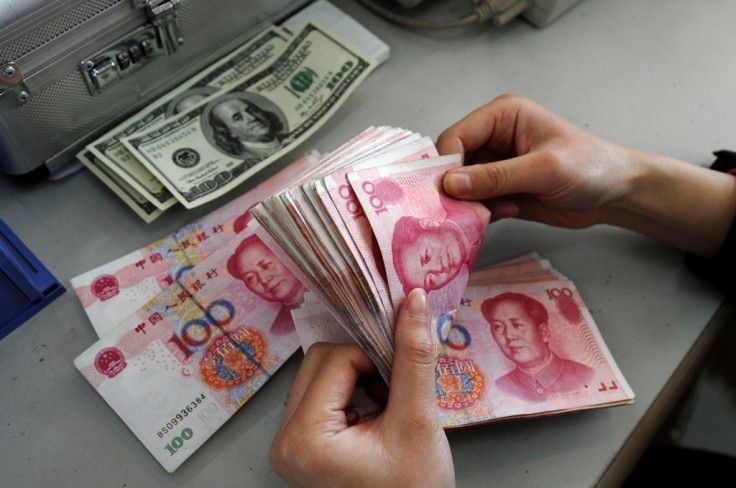Is China finally loosening its grip on the yuan?

The yuan tumbled further as China's central bank weakened its currency for the second day in a row on Wednesday. Is China finally going to loosen its grip on the yuan and let market forces dictate where it heads, or is this just another one-off fall in the fixing rate?
The truth is no one knows. Analysts say it will take weeks or even months before Beijing's plans for the yuan become clear.
On 12 August, the People's Bank of China set the yuan fixing at 6.3306 against the dollar, which was 1.6% lower than the previous day. CNBC said this signaled its commitment to the change it outlined on Tuesday - that daily fixings will be determined by the previous day's closing spot prices and market-moves of other major currencies.
China allows the yuan to trade only within a 2% range on either side of the daily reference rate, although the State Council has signaled it intends to widen the band, AFP said.
"The exact impact will depend on how the new mechanism is implemented in practice."
Following Tuesday's statement, there were speculation that the move was aimed at boosting Beijing's hopes of getting the yuan into the International Monetary Fund's basket of currencies.
The IMF is currently reviewing the Special Drawing Right (SDR), an international reserve comprising the euro, Japanese yen, pound sterling and the US dollar. The SDR composition is reviewed every five years and the next review is scheduled to take place by the end of 2015.
Shanghai Daily noted that joining the SDR could boost the yuan's international recognition and use of the currency, eventually lifting China's financial power.
The New York Times agreed saying: "China is looking to assert more of a leadership role in the global economy, and an important piece of that is establishing the renminbi as a reserve currency.
"The dollar and the euro have a reach and usefulness far beyond the borders of the countries that use them, and China would like the renminbi to have a similar sway in global trade and finance, especially in Asia," the newspaper added.
It said Tuesday's devaluation and announcement that accompanied it, came as a shock to global markets as China's leaders had been in the past reluctant to give up the power over a crucial tool to manage the economy and protect the country from global economic forces.
An IMF spokesman has confirmed on Wednesday that Tuesday's historic move was a welcome step but one that had "no direct implications for the criteria used in determining in the composition of the SDR basket."
"While Tuesday's language seems to hint at a major step in the reform of the FX regime, we caution to read too much into this statement."
The spokesman said: "Greater exchange rate flexibility is important for China as it strives to give market forces a decisive role in the economy and is rapidly integrating into global financial markets. The exact impact will depend on how the new mechanism is implemented in practice."
Despite the weaker fixing for the second day, the PBoC issued a statement Wednesday that further perplexed the market. It said there was no basis for the continued yuan depreciation, citing "ample forex reserves" and a "stable financial system" as supportive factors of exchange rate stability.
Whither the yuan?
So what is China's strategy? For the moment, no one knows.
"It all depends on whether this step-change is the start of a move towards a more flexible exchange rate regime or an old-style devaluation. As the weeks unfold it will become clear whether Beijing is indeed minded on allowing more flexibility," Diana Choyleva, head of research and chief economist at Lombard Street Research said, according to CNBC.
JP Morgan's economists voiced the same sentiments, saying: "While Tuesday's language seems to hint at a major step in the reform of the FX regime, we caution to read too much into this statement.
"In the weeks or even months to come, what would happen if spot continues to trade on the weak side of the bank?"
The market will be keen to see what the central bank will do if the yuan's fixing indeed becomes more market-oriented, which would imply greater volatility and weakness.
Goldman Sachs, in a report on Wednesday said: "While more FX flexibility is likely helpful [for SDR inclusion], a sharp, government-engineered currency weakness against the dollar will likely create unnecessary political resistance to the process."
There are also concerns that a weaker yuan will heighten capital outflows.
"If you toy with the currency too aggressively, you risk a more aggressive capital flight coming out of domestic assets like the property market or A-share equities. Neither of those is a palatable for policymakers,"Michael Kurtz, global head of equity strategy at Nomura told CNBC.
BNP Paribas believes Beijing will continue to "resist the devaluation temptation because it would not significantly help Chinese exports and economy growth." Instead, it could lead to destabilising capital outflows due to expectations of further devaluation and worsen the financial burden of Chinese companies with large and unhedged foreign currency debt.
Then of course, there is the other concern. "While it is too early to say whether this is the beginning of a sustained devaluation of the yuan, other central banks may be forced to follow suit and that may trigger a fresh round of currency weakening in the emerging world," Rajeev De Mello, head of Asian fixed income at Schroders in Singapore told Reuters.
© Copyright IBTimes 2025. All rights reserved.






















